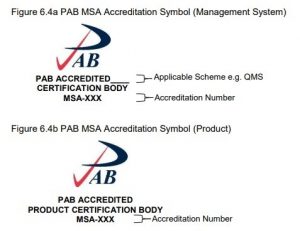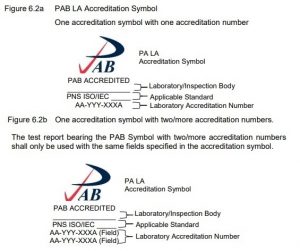Frequently Asked Questions
Third party attestation related to a conformity assessment body, conveying formal demonstration of its competence, impartiality, and consistent operation in performing specific conformity assessment activities. (Source: ISO/IEC 17000:2020 Conformity Assessment—Vocabulary and general principles) In simple terms, accreditation is the process in which an authoritative body formally recognizes the competence, impartiality, and capability of an organization to carry out specific activities, like certification, testing, calibration and inspection. Third-party attestation related to an object of conformity assessment (e.g. product, process, service, system, installation, project, data, design, material, claim, person, body, or organization) with the exception of accreditation. (Source: ISO/IEC 17000:2020 Conformity Assessment—Vocabulary and general principles) For National Authorities and Regulators (Source: Accreditation: A global tool to support public policy, www.ilac.org) For Business Holding accredited conformity assessment results shows credible evidence of conformance with national and international standards and regulations which can differentiate a business from its competitors. As accreditation is recognized internationally, it can open doors overseas equally as well as those in the domestic market. Indeed, an increasing number of organizations in both the public and private sectors in domestic markets and overseas are specifying accredited testing, inspection or certification as a precondition to tendering for contracts. Accredited conformity assessment can also contribute to the operational efficiency of businesses in other ways, saving time and money by reducing bureaucracy and by helping with risk management and key aspects of decision-making. For instance, it can be used as a basis in making efficient and informed choices on domestic suppliers and promotes confidence in imports from other countries. It can also demonstrate due diligence in the event of legal action. (Source: Accreditation: Facilitating world trade, www.ilac.org) For Consumers International accreditation agreements help in increasing the choice of goods and services available on the market and help to ensure that these meet relevant standards of quality and safety, whatever their country of origin. (Source: Accreditation: Facilitating world trade, www.ilac.org) The Philippine Accreditation Bureau (PAB) formerly Philippine Accreditation Office is the national accreditation body of the Philippines and the central body to accredit inspection, testing and certifying bodies and other bodies offering conformity assessment services in accordance with Executive Order 802. The PAB is recognized internationally through its membership to the International Accreditation Forum (IAF), International Laboratory Accreditation Cooperation (ILAC), Asia Pacific Accreditation Cooperation (APAC), Association of South East Asian Nations (ASEAN) Consultative Committee on Standards and Quality (ACCSQ) Working Group on Accreditation and Conformity Assessment (WG2) and International Halal Accreditation Forum (IHAF). PAB is also a signatory to the Multilateral Recognition Arrangement (MLA) for Quality Management System (QMS), Environmental Management System (EMS), Food Safety Management System (FSMS), and Product Certification of APAC and IAF, Mutual Recognition Arrangement (MRA) for testing, calibration, medical and inspection of APAC and ILAC. The Bureau promotes accreditation of Conformity Assessment Bodies (CABs) locally and internationally through information campaign using various media; participation in local and international marketing events; continuous compliance with MRA/MLA requirements; and consultations and dialogues with stakeholders. Body that performs conformity assessment activities, excluding accreditation. (Source: ISO/IEC 17000:2020 Conformity Assessment—Vocabulary and general principles) “Conformity assessment is the process for demonstrating that expectations about products and services (e.g. features like quality, ecology, safety, economy, reliability, compatibility, interoperability, efficiency and effectiveness) fulfilled the specified requirements of standards, regulations and other specifications.” Example of Conformity Assessment Body (CAB): A Mutual Recognition Arrangement (MRA) is an international agreement that promotes trust and builds confidence among accreditation bodies through their ability to determine a laboratory’s competence to carry out testing or calibration. This MRA forms a regional network of laboratories and inspection bodies accredited by accreditation bodies that have been peer-evaluated and recognized as being competent. This network facilitates the acceptance of test, calibration and inspection reports in the region, thus contributing to the facilitation of trade and the free-trade goal of “tested/inspected once, accepted everywhere”. Under MRAs, tests/inspections performed by laboratories accredited by a signatory country like PAB are recognized and accepted by fellow signatory countries. (Source: www.ilac.org) A Multilateral Recognition Arrangement (MLA) enhances the acceptance of goods and services across national borders. Through the MLA, there is assurance of mutual recognition of accredited certification between signatories to the MLA and the subsequently acceptance of accredited certification in many markets based on one accreditation. This recognition and acceptance removes technical barriers to trade (TBT) by reducing redundant conformity assessment. Accreditations granted by MLA signatories like PAB is recognized worldwide based on their equivalent accreditation programs, reducing costs and adding value to business and consumers. (Source: www.iaf.nu) Accredited Certificates, Test/Calibration/Inspection Reports can be recognized by PAB Accreditation Symbol with corresponding accreditation number/s as shown below: A. For Accredited Certification Body B. For Accredited Testing Laboratory, Medical Testing, Calibration Laboratory and Inspection Body Accreditation is available to any type of Conformity Assessment Body (CAB) (e.g. certification body, verification and validation body, testing laboratory (including medical), calibration laboratory, and inspection body) who can comply with PAB Terms and Conditions for Accreditation and general requirements following specific scheme requirements and International Standards. For Certification Body (i.e. Management System, Product and Person), and Verification Body, please refer to MSA/P01 MSA-Quality Procedure – The Accreditation Process, downloadable at https://www.dti.gov.ph/pab/resources/certify-body-guidance-documents/. For testing laboratory, medical testing, calibration laboratory, inspection body, and proficiency testing provider, please refer to LA/GD01 Accreditation Process, downloadable at https://www.dti.gov.ph/pab/resources/lab-inspect-guidance-documents/. Please select what specific accreditation you are inquiring: Kindly refer to the “Resources” page of our website: www.dti.gov.ph/pab, and check the downloadable forms. A. For Certification Body: A.1 The following is the schedule of fees which shall be collected from an applicant or accredited certification body: Application fee (non-refundable, payable upon issuance of application form) Php 2,000.00 per scheme Assessment fees (include documentation review, initial assessment, surveillance assessment, special assessment, reassessment, witness audit) Php 5,000.00 per man-day Accreditation fee (payable upon issuance of accreditation of certificate) Php 10,000.00 per scope of accreditation Annual accreditation fee Php 5,000.00 per scope of accreditation A.2 Transportation, accommodation, and airport taxes expenses of PAB assessment team shall be borne by the applicant or accredited certifying body. A.3 Payment for contracted members of the assessment team shall be paid by the certifying body based on billing statement issued by PAB. A.4 The PAB shall not refund any fee paid, if the application is not approved, withdrawn or discontinued or if the Certificate of Accreditation is suspended or cancelled. A.5 Certifying Body shall be answerable for accidents that may occur during the assessment, if it can be proven that faults or negligence is contributed by them. A.6 Fees shall be payable to the Department of Trade and Industry. Payments shall be coursed through the Philippine Accreditation Bureau. For full details of fees for Certification Body (Management System, Product, Halal, and Person) & Verification Body accreditation, please refer to MSA/GD02 PAB-MSA Schedule of Fees, downloadable at https://www.dti.gov.ph/pab/resources/certify-body-guidance-documents/. For full details of fees for Testing Laboratory, Medical Testing, Calibration Laboratory, Inspection Body, and Proficiency Testing Providers, please refer to LA/GD01 Accreditation Process, downloadable at https://www.dti.gov.ph/pab/resources/lab-inspect-guidance-documents/. B. For testing laboratory, medical testing, calibration laboratory and inspection body: The following is the schedule of fees relative to the implementation of PAB B.1 Laboratory Accreditation which shall be collected from an applicant or accredited laboratory/inspection body: Application fee PHP 300.00 Assessment fees (include travel time, documentation review, initial assessment, surveillance assessment, special assessment, reassessment) PHP 500.00 per man-hour Accreditation fee (payable upon issuance of accreditation of certificate) Php 5,000.00 per scope of accreditation Annual accreditation fee Php 3,000.00 per organization B.2 Transportation, accommodation and airport taxes expenses of PAB assessment team shall be borne by the laboratory/inspection body. B.3 Fees shall be payable to the Department of Trade and Industry. Payments shall be coursed through the Philippine Accreditation Bureau. For full details, please refer to LA/GD05- PAB Schedule of Fees. Timeline from the acceptance of complete application requirements to the granting of PAB accreditation depends on the applicant’s conformity with PAB requirements, the range of tests/inspection fields or complexity of scope of the accreditation, availability of witnessing and clearance of incidences of non-conformance highlighted during the document review and assessment. A reasonable time frame is between six months to one year. All list of PAB accredited CABs, certificates, and scopes of accreditation are published in the website. Management System Certification Bodies Product Certification Bodies Validation/ Verification Bodies Calibration Laboratories Testing Laboratories Medical Laboratories Inspection Bodies Proficiency Testing Providers Although PAB is using copy of International Standards, PAB does not provide or sell any Philippine National Standards and International Standards to the public. These can be purchase at Bureau of Philippine Standards. Bureau of Philippine Standards Website: www.bps.dti.gov.ph An individual who wants to apply as subcontracted PAB assessor or technical expert shall meet the required qualifications of PAB in terms of education, relevant trainings specific to field of expertise, professional experiences and PAB criteria for assessors and experts. For further information, please reach us to the following contact details: Management System Accreditation Division Laboratory Accreditation Division

3/F Trade and Industry Building
361 Sen. Gil Puyat Ave., Makati City
Phone: (+632) 7791.3331
Email: bps@dti.gov.ph
Mobile No: 0917-819-2971
E-mail: pab_msad@dti.gov.ph
Mobile No: 0917-811-6026
E-mail: pab-lad@dti.gov.ph


